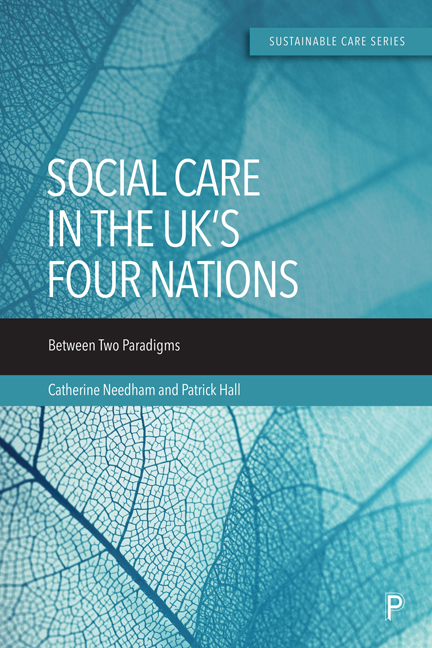Book contents
- Frontmatter
- Contents
- Series editors' preface
- List of figures, tables and boxes
- About the authors
- Acknowledgements
- 1 Comparing adult social care systems in the UK
- 2 What is social care policy for?
- 3 What is in crisis? The context of care policy in the four nations
- 4 The mechanisms of social care reform
- 5 The outcomes of social care reform
- 6 Territorial policy communities: scale, style and scope
- 7 The limits of social care reform
- 8 Conclusion: between care paradigms
- References
- Index
8 - Conclusion: between care paradigms
Published online by Cambridge University Press: 20 January 2024
- Frontmatter
- Contents
- Series editors' preface
- List of figures, tables and boxes
- About the authors
- Acknowledgements
- 1 Comparing adult social care systems in the UK
- 2 What is social care policy for?
- 3 What is in crisis? The context of care policy in the four nations
- 4 The mechanisms of social care reform
- 5 The outcomes of social care reform
- 6 Territorial policy communities: scale, style and scope
- 7 The limits of social care reform
- 8 Conclusion: between care paradigms
- References
- Index
Summary
In this book we have compared the adult social care systems of England, Scotland, Wales and Northern Ireland to understand convergence and divergence between them, in terms of discursive framings, decisions, practice and results (Pollitt, 2002; McConnell, 2010). We began by identifying a shared set of values across the policy reform documents of the four nations. Across the 25 years we can see a common articulation of the importance of wellbeing, rights, fairness, quality and sustainability within care systems. The importance of wellbeing in particular has grown over time, along with a commitment to asset-based approaches and person-centred care. All four nations highlighted the importance of fairness as an underpinning principle, particularly in relation to the reform of care funding. In Scotland, Wales and Northern Ireland rights remain an important underpinning principle of care reform, whereas in England this framing has been less evident under the Conservative-led governments in power since 2010.
In Chapter 3, we considered the supply and demand elements of care systems as part of understanding their contexts. In all four nations, demand for care is rising as a result of demographic pressures. Using the care diamond model, we looked at how care has tipped between the points of state, market, family and community, recognising that each of these has encountered a crisis in how it responds to care. In all four nations there is recognition that families and other unpaid carers need more support, particularly given the strains of the COVID-19 pandemic in which many formal services were withdrawn. The crisis of the state has been most evident in England where levels of funding have dropped well below the other nations, and where it is the market that is expected to respond to growing levels of demand. There is more optimism about the role of the state in Scotland and Wales, exemplified by their plans to develop a National Care Service to sit alongside the NHS and their diffidence about using the term ‘market’ in a care context. Northern Ireland has had to deal with the legacy of a contested state, in which care has been ‘depoliticised’ through being handed to Health and Social Care Trusts and integrated with health. In all four nations, there is optimism about the community as a site of care, which can relate to new forms of ownership, more co-production of services with people with lived experience, or more preventative investment to keep people out of formal services.
- Type
- Chapter
- Information
- Social Care in the Uk's Four NationsBetween Two Paradigms, pp. 171 - 179Publisher: Bristol University PressPrint publication year: 2023



